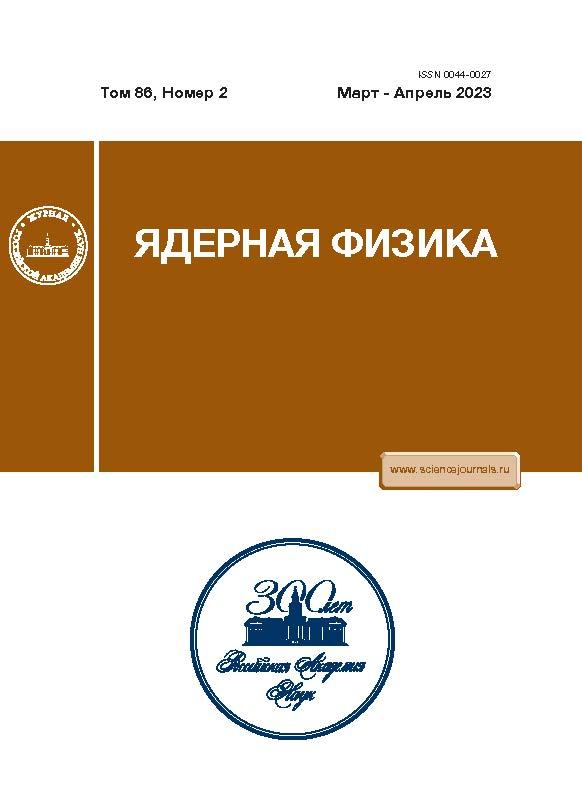Fragmentation of Nuclei under the Effect of Radiation of Various Types
- Autores: Novikov N.V.1, Chechenin N.G.1, Shirokova A.A.1
-
Afiliações:
- Lomonosov Moscow State University, Skobeltsyn Institute of Nuclear Physics
- Edição: Volume 86, Nº 2 (2023)
- Páginas: 361-368
- Seção: МАТЕРИАЛЫ LXXII МЕЖДУНАРОДНОЙ КОНФЕРЕНЦИИ “ЯДРО-2022: ФУНДАМЕНТАЛЬНЫЕ ВОПРОСЫ И ПРИЛОЖЕНИЯ”. Элементарные частицы и поля. Эксперимент
- ##submission.datePublished##: 01.04.2023
- URL: https://rjpbr.com/0044-0027/article/view/674719
- DOI: https://doi.org/10.31857/S0044002723020150
- EDN: https://elibrary.ru/RJTWGQ
- ID: 674719
Citar
Texto integral
Resumo
An analytic approximation is proposed for a determination of the distribution of the inelastic energy loss of charged fragments originating from nuclear reactions induced by collisions of protons, photons, and electrons with silicon nuclei. It is shown that, in the energy range between 3 and 10 GeV, the effect of the hadronization process on this distribution for heavy secondary ions increases with incident-radiation energy. A strong asymmetry of the distribution calculated for collisions with relativistic electrons is indicative of a momentum transfer to only a small fragment of the nucleus involved.
Sobre autores
N. Novikov
Lomonosov Moscow State University, Skobeltsyn Institute of Nuclear Physics
Email: nvnovikov65@mail.ru
Rússia, 119991, Moscow
N. Chechenin
Lomonosov Moscow State University, Skobeltsyn Institute of Nuclear Physics
Email: nvnovikov65@mail.ru
Rússia, 119991, Moscow
A. Shirokova
Lomonosov Moscow State University, Skobeltsyn Institute of Nuclear Physics
Autor responsável pela correspondência
Email: nvnovikov65@mail.ru
Rússia, 119991, Moscow
Bibliografia
- Г. И. Зебрев, Радиационные эффекты в кремниевых интегральных схемах высокой степени интеграции (НИЯУ МИФИ, Москва, 2010).
- Модель космоса. Воздействие космической среды на материалы и оборудование космических аппаратов, Под ред. Л. С. Новикова (Изд-во КДУ, Москва, 2007), т. II.
- С. Г. Рубин, Устройство нашей вселенной (Век2, Фрязино, 2006).
- М. И. Панасюк, Странники Вселенной или эхо Большого взрыва (Век2, Фрязино, 2005).
- Nuclotron-based Ion Collider fAcility (NICA), https://nica.jinr.ru/ru/
- STAR Collab. (J. Adams, M. M. Aggarwal, Z. Aham- med, J. Amonett, B. D. Anderson, D. Arkhipkin, G. S. Averichev, S. K. Badyal, Y. Bai, J. Balewski, O. Barannikova, L. S. Barnby, J. Baudot, S. Bekele, V. V. Belaga, et al.), Nucl. Phys. A 757, 102 (2005).
- G. Aad et al. (ATLAS Collab.), Phys. Lett. B 716, 1 (2012).
- S. Chatrchyan et al. (CMS Collab.), Phys. Lett. B 716, 30 (2012).
- H. Yamamoto, Symmetry 13, 674 (2021).
- А. Г. Ситенко, Теория ядерных реакций (Энергоатомиздат, Москва, 1983).
- H. W. Bertini, Phys. Rev. 131, 1801 (1963).
- Н. В. Новиков, Н. Г. Чеченин, Т. В. Чувильская, В. Я. Чуманов, А. А. Широкова, ЯФ 84, 315 (2021).
- Б. С. Ишханов, И. М. Капитонов, Взаимодействие электромагнитного излучения с атомными ядрами (Изд-во МГУ, Москва, 1979).
- J. F. Ziegler, M. D. Ziegler, and J. P. Biersack, Nucl. Instrum. Methods B 268, 1818 (2010).
- J. Allison, K. Amako, J. Apostolakis, P. Arce, M. Asai, T. Aso, E. Bagli, A. Bagulya, S. Banerjee, G. Barrand, B. R. Beck, A. G. Bogdanov, D. Brandt, J. M. C. Brown, H. Burkhardt, Ph. Canal, et al., Nucl. Instrum. Methods A 835, 186 (2016).
- A. J. Koning and D. Rochman, Nucl. Data Sheets 113, 2841 (2012).
Arquivos suplementares














